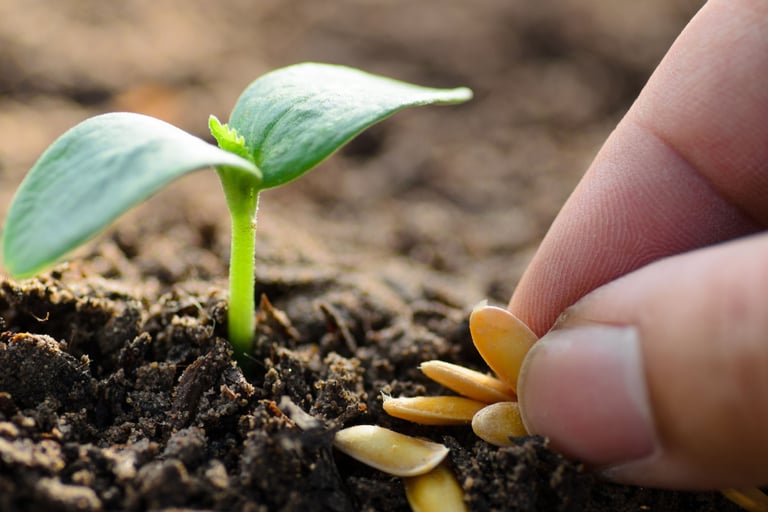Seeds
Seeds: The Foundation of Growth and Abundance
Introduction
Seeds are the cornerstone of agriculture and gardening, serving as the
starting point for plant life. They contain the genetic blueprint for plants,
offering a range of varieties suited to different climates, soil conditions,
and growing needs. This page delves into the essential aspects of seeds,
including their types, benefits, and best practices for selection and planting.
What Are Seeds?
Seeds are reproductive structures produced by plants that contain the embryo
of a new plant, along with stored nutrients to support its initial growth.
They come in various shapes, sizes, and types, each suited to different growing conditions and purposes. Understanding the different types of seeds and their characteristics is crucial for successful planting and cultivation.
Types of Seeds
Hybrid Seeds
Description: Hybrid seeds are the result of crossbreeding two different plant varieties to produce offspring with specific desired traits, such as improved yield, disease resistance, or enhanced flavor.
Advantages:
Higher yields and better quality produce.
Increased resistance to pests and diseases.
Uniform growth and maturity.
Considerations:
Seeds must be purchased each season as they do not produce true-to-type offspring.
Heirloom Seeds
Description: Heirloom seeds come from traditional varieties that have been passed down through generations. These seeds are known for their unique flavors, colors, and characteristics.
Advantages:
Genetic diversity and adaptability.
Rich heritage and historical value.
Seeds can be saved and replanted year after year.
Considerations:
May be less uniform in growth compared to hybrids.
Open-Pollinated Seeds
Description: Open-pollinated seeds are pollinated naturally by insects, wind, or other natural mechanisms. They produce plants that are similar to the parent plants.
Advantages:
Ability to save and replant seeds.
Better suited for organic and sustainable gardening.
Considerations:
May require more space to maintain genetic purity.
Organic Seeds
Description: Organic seeds are grown without synthetic chemicals, fertilizers, or genetically modified organisms (GMOs). They adhere to organic farming standards.
Advantages:
Environmentally friendly and sustainable.
Free from synthetic pesticides and fertilizers.
Considerations:
May be more expensive than conventional seeds.
GMO Seeds
Description: Genetically Modified Organism (GMO) seeds have been altered at the genetic level to exhibit specific traits, such as resistance to pests or tolerance to herbicides.
Advantages:
Enhanced resistance to pests and diseases.
Improved crop yield and efficiency.
Considerations:
Controversy surrounding environmental and health impacts.
Seeds are typically not available for saving and replanting.
Seed Selection and Sourcing
Choosing the Right Seeds
Climate Compatibility: Select seeds that are suited to your local climate and growing conditions.
Soil Type: Consider soil requirements for optimal growth.
Planting Season: Choose seeds that align with the appropriate planting season for your region.
Sourcing Seeds
Seed Catalogs: Review seed catalogs from reputable suppliers for detailed information and variety options.
Local Nurseries: Purchase seeds from local nurseries or garden centers for varieties adapted to your area.
Online Retailers: Explore online seed retailers for a broader selection and specialty varieties.
Seed Preparation and Planting
Seed Germination
Soaking: Some seeds benefit from soaking before planting to enhance germination.
Scarification: Hard-coated seeds may need to be scratched or nicked to encourage sprouting.
Stratification: Certain seeds require a period of cold treatment to break dormancy.
Planting Techniques
Direct Sowing: Sow seeds directly into the soil where they will grow to maturity.
Starting Indoors: Begin seeds indoors in trays or pots and transplant seedlings to the garden when ready.
Spacing and Depth: Follow seed packet instructions for optimal spacing and planting depth.
Seed Storage
Storage Conditions
Temperature: Store seeds in a cool, dry place to maintain viability.
Humidity: Keep seeds in airtight containers to prevent moisture exposure.
Light: Protect seeds from direct sunlight to avoid degradation.
Seed Longevity
Viability: Check seed viability regularly and use seeds within their recommended shelf life.
Testing: Perform germination tests to ensure seeds will sprout effectively.
Benefits of Using Quality Seeds
Improved Yields
High-quality seeds lead to better crop yields and healthier plants.
Enhanced Plant Health
Seeds with good genetics and proper care produce robust and disease-resistant plants.
Sustainable Practices
Choosing the right seeds promotes sustainable agriculture and reduces the need for chemical inputs.
Common Seed Problems and Solutions
Poor Germination
Causes: May result from old or improperly stored seeds.
Solutions: Test seed viability and ensure proper planting conditions.
Pest and Disease Issues
Causes: Seeds can carry pests or diseases that affect plant growth.
Solutions: Purchase seeds from reputable sources and practice good garden hygiene.
Inconsistent Growth
Causes: Variability in seed quality can lead to uneven plant growth.
Solutions: Choose uniform seed varieties and provide consistent care.
Conclusion
Seeds are the building blocks of successful gardening and agriculture. By understanding the different types of seeds, selecting high-quality options, and following best practices for planting and storage, you can ensure a thriving garden or farm. Invest in quality seeds and enjoy the satisfaction of nurturing plants from the very beginning, ultimately leading to a bountiful harvest and a vibrant growing environment.


About Agri Agro Grand Expo
Agri Agro Grand Expo International has served as a platform for bringing together many foreign as well as national visitors from all over the country to interact with leading national agriculture technology companies. The Agriculture Expo, held annually, is one of the leading national agriculture events of its kind, showcasing cutting-edge agricultural technologies. This exhibition in India traditionally attracts numerous Ministers of Agriculture, decision-makers, experts, practitioners, and trainers in agriculture, along with thousands of visitors from around the country.
contact :
expo@agriagro.in
exposulabh@agriagro.in
+91-9520099666
+91 -70601 71734
+91 -8791144200
© 2026 Agri Agro Grand Expo All rights reserved.
Mail:
